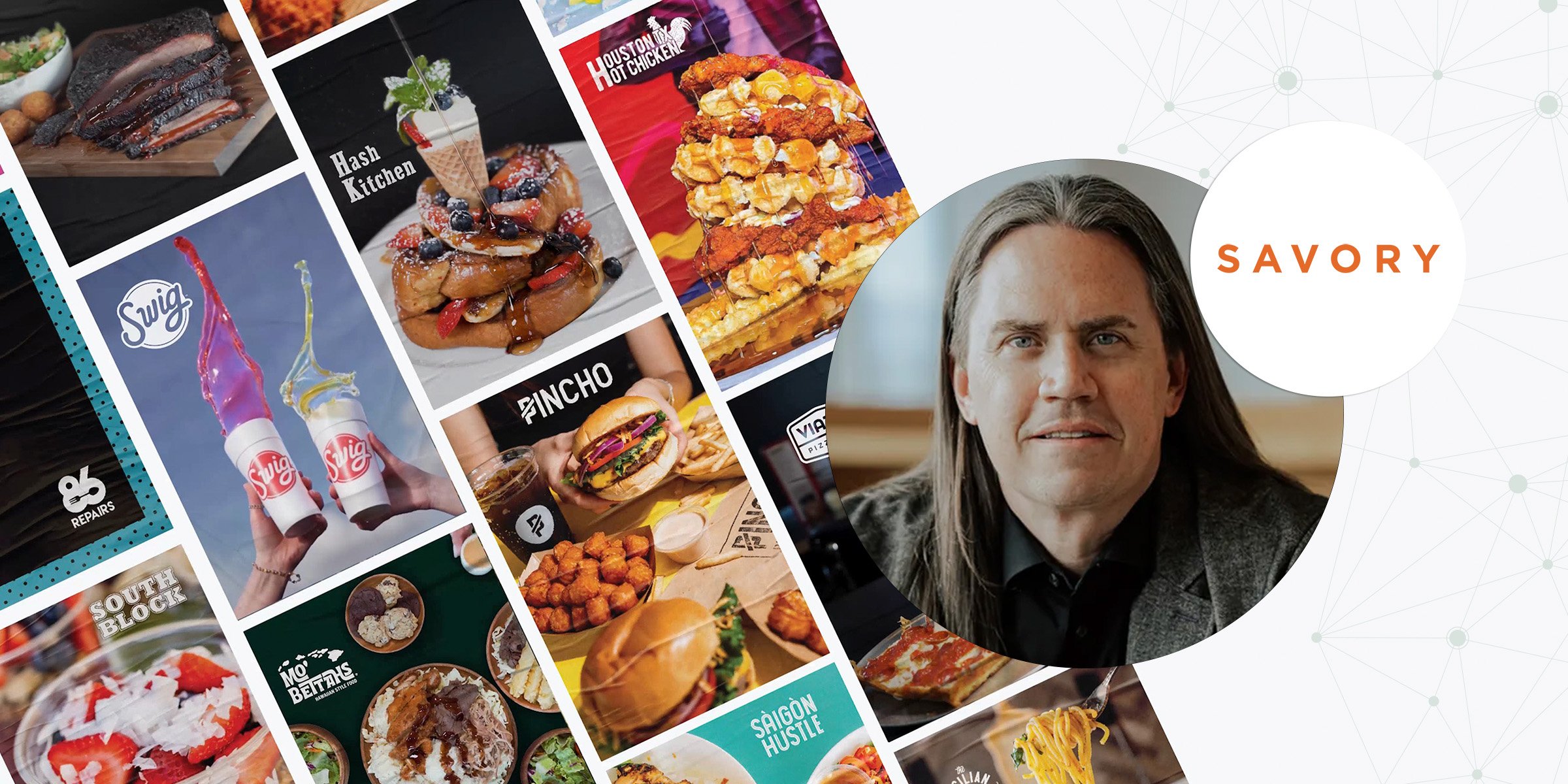
In our latest Q&A, we sat down with Andrew K. Smith, Managing Director at the Savory Fund, to delve into the dynamic world of the restaurant industry over the past three years. Join us as we explore shifting strategies, innovative deal sourcing, and the valuable lessons learned along the way.
Q: Reflecting on Your Journey: Looking back at your transition from tech entrepreneur to the restaurant industry, how have your early experiences continued to shape your approach to building and acquiring restaurants?
A: My transition from a tech entrepreneur to the restaurant industry has been both challenging and rewarding. My early experiences in the tech sector have significantly influenced my approach to building and acquiring restaurants.
One of the key lessons from my tech background is the importance of innovation and staying ahead of trends. In the restaurant industry, this translates to constantly exploring new culinary concepts, embracing technology for operational efficiency, and creating unique dining experiences that resonate with our target audience.
Additionally, my tech entrepreneurship taught me the value of data-driven decision-making. At Savory, we leverage data analytics to make informed decisions about menu development, marketing strategies, and location selection. This data-centric approach has been instrumental in optimizing our operations and enhancing customer satisfaction.
Furthermore, my experience in building scalable tech businesses has shaped our approach to expansion. We focus on creating replicable restaurant models that can be easily scaled across different locations while maintaining consistency in quality and service.
Lastly, the importance of building a strong team and fostering a collaborative culture was a crucial lesson from my tech journey. In the restaurant business, the team's passion and dedication are pivotal for success. We prioritize hiring talented individuals who share our vision and invest in their growth and development.
These principles have been the cornerstone of Savory's success and will continue to guide our future endeavors.
Q: Continued Growth: What does your portfolio look like these days? How has Savory Fund sustained and supported their growth trajectory?
A: Our portfolio at Savory Fund has evolved significantly over the years, reflecting our commitment to diversifying and strengthening our presence in the food and beverage industry. Currently, it encompasses a wide range of concepts, from fast-casual eateries and quick service concepts to casual dining establishments. Each brand within our portfolio is carefully selected for its unique value proposition, market potential, and alignment with consumer trends. But we have made a prudent decision to not make investments into fad type concepts (i.e ice cream, cupcakes, cookies, etc) and more into habitual concepts, and resilient segements (i.e. pizza, burgers, chicken, asian, etc).
To sustain and support our growth trajectory, we've implemented several key strategies. Firstly, we've focused on operational excellence. By streamlining processes, implementing cutting-edge technology, and fostering a culture of continuous improvement, we've been able to enhance efficiency and profitability across our portfolio.
Secondly, we've prioritized strategic expansion. We carefully analyze market trends, demographic shifts, and real estate opportunities to identify optimal locations for new outlets. This targeted approach ensures that we expand our footprint in a way that maximizes returns and brand visibility.
Thirdly, we've invested heavily in marketing and brand development. In today's competitive landscape, it's crucial to build strong brand identities and engage effectively with customers. Our internal creative and marketing team is one of the best I’ve seen in the industry today and taking each of our brands through a creative refresh is on point with the strategy to galvanize our guests to each of our portfolio companies. Our marketing efforts are data-driven and tailored to each brand's target audience, ensuring that we resonate with consumers and build loyal followings.
Lastly, we've maintained a strong focus on innovation. Whether it's experimenting with new menu items, exploring sustainable practices, or adopting the latest in food technology, we're always looking for ways to stay ahead of the curve and offer something fresh and exciting to our customers.
In summary, our portfolio at Savory Fund is diverse and dynamic, reflecting our commitment to excellence and innovation in the food and beverage industry. By focusing on operational efficiency, strategic expansion, brand development, and innovation, we've been able to sustain and support our growth trajectory, positioning ourselves for continued success in the years to come.
Q: Evolving Strategies: Have there been any shifts or evolutions in Savory Fund's strategies in the post-pandemic era? How has the landscape influenced your approach to scaling, growing, and investing in the F&B industry?
A: In the post-pandemic era, Savory Fund has certainly experienced shifts and evolutions in our strategies to adapt to the changing landscape of the food and beverage industry. The pandemic has brought about significant changes in consumer behavior, supply chain dynamics, and operational challenges, which have influenced our approach to scaling, growing, and investing in the sector.
One of the major shifts has been the increased emphasis on digitalization and technology. The pandemic accelerated the adoption of online ordering, delivery services, and contactless payment systems. In response, we've invested in enhancing the digital capabilities of our portfolio companies, ensuring they can effectively meet the demands of the modern consumer and streamline operations.
Another evolution in our strategy has been the focus on flexibility and resilience. The uncertainties brought about by the pandemic highlighted the importance of having adaptable business models. We've encouraged our portfolio companies to diversify their revenue streams, such as by expanding their takeout and delivery options, simplifying their menus, and making execution easier and on point, and developing new menu items that keep their brand exciting and fresh.
In terms of growth and scaling, we've become more cautious and strategic in our expansion plans. The pandemic underscored the importance of financial prudence and market analysis. We're focusing on strengthening the core of our existing brands and pursuing expansion opportunities that offer clear competitive advantages and alignment with consumer trends and not spreading ourselves out too much as we execute our strategic vision.
Q: Deal Sourcing and Selection Criteria: Given the changing dynamics, how has deal sourcing transformed over the past three years? Are there specific criteria or considerations that have become more prominent in selecting potential investments?
A: Deal sourcing for Savory has undergone notable transformations over the past three years, driven by the shifting dynamics of the post-pandemic landscape. At Savory Fund, we've adapted our approach to reflect these changes and ensure that we continue to identify and capitalize on the most promising investment opportunities.
One significant shift has been the increased reliance on our strong reputation that has been built over the past five years. Savory has quickly become a household name in this industry among the emerging elite brands. We have also been in the middle of all in-person networking events and industry conferences, panelists for different industry conversations both in person and on podcasts, leveraged online platforms, social media, and virtual events to discover and connect with new brands filling the pipe for future, potential investments. To date, we have an extremely full deal pipeline, and it seems to be persistent.
Another transformation has been the heightened focus on resilience and adaptability in potential investments. The pandemic highlighted the importance of businesses that can quickly pivot and adapt to changing market conditions. Consequently, we now place greater emphasis on evaluating a company's agility, its ability to innovate, and the strength of its supply chain when considering an investment.
Furthermore, the acceleration of technology adoption in the F&B industry has led us to prioritize investments in companies that effectively integrate technology into their operations. This includes the use of digital ordering systems, data analytics for decision-making, and automation to improve efficiency.
Q: Current Opportunities: Looking at the private market now, what opportunities do you see for investors? Have there been new areas of focus or sectors that have become particularly interesting or promising?
A: The private market currently presents a variety of opportunities for investors, particularly in the wake of the pandemic, which has accelerated certain trends and created shifts in consumer behavior. Here are some areas of focus and sectors that have become particularly interesting or promising.
1. Health and Wellness: The health and wellness sector has expanded beyond traditional healthcare to include fitness tech and nutrition, leading to increased investment in this space. We feel that the ‘better-for-you’ category is capturing a shift in consumer spending due to the epidemic.
2. Sustainable Practices: Consumers are increasingly concerned about the environmental and social impact of their food choices. Brands that prioritize sustainability, ethical sourcing, and transparency in their operations and supply chain are gaining traction.
3. Alternative Proteins: The alternative protein sector, including plant-based and lab-grown meat, is expanding rapidly. Brands that are developing innovative products in this space are attracting significant investor interest.
4. Snackification: As consumers seek convenience and on-the-go options, there is a rise in demand for healthy, portable snacks. Brands that can offer innovative snacking solutions with a focus on nutrition and convenience are poised for growth.
5. Global Flavors: Consumers are increasingly adventurous in their food choices, seeking authentic and exotic flavors from around the world. Brands that can bring unique global cuisines and ingredients to the mainstream market have the potential to capture a niche audience.
For investors, the key is to identify emerging brands that are not only aligned with these trends but also have a strong business model, a clear value proposition, and the potential for scalability. Due diligence, including market research, financial analysis, and an assessment of the brand's leadership and vision, is essential to making informed investment decisions in this dynamic industry.
Overall, the private market offers opportunities for investors to capitalize on emerging trends and sectors that are poised for growth. It's important for investors to conduct thorough due diligence and consider the long-term potential of these investments in the context of their overall portfolio strategy.
Q: Insights into Future Trends: Given your experience, what trends do you foresee in the F&B industry, and how does Savory Fund position itself to capitalize on emerging opportunities in the coming years?
A: Based on our experience at Savory Fund, we anticipate several key trends in the food and beverage (F&B) industry that will shape the landscape in the coming years:
1. Technology Integration: The integration of technology will continue to be a driving force in the F&B industry. From digital ordering and delivery platforms to kitchen automation and data analytics, technology will play a crucial role in enhancing operational efficiency, customer experience, and personalization.
2. Better-for-You and Health and Wellness: Consumers are increasingly prioritizing health and wellness, leading to a surge in demand for healthier food options, functional beverages, and lower calorie alternatives but maintaining flavor. This trend is expected to persist, with a focus on natural ingredients and transparency of products used.
3. Ghost Kitchens and Delivery: The rise of ghost kitchens and delivery-only models was a little chaotic and didn’t work well coming out of the pandemic. The economics didn’t work, but it has improved and is now something that makes sense as an additive strategy to low-cost new region and market testing.
4. Experiential Dining: Despite the growth in delivery and takeout, there will be a renewed interest in experiential dining as consumers seek unique and memorable dining experiences. This includes themed restaurants, immersive environments, and interactive culinary experiences.
6. Global Flavors and Fusion Cuisine: The demand for diverse and global flavors will continue to grow, with consumers seeking authentic and innovative culinary experiences. Fusion cuisine and cross-cultural influences will play a significant role in menu development.
To capitalize on these emerging opportunities, Savory Fund is positioning itself to originate the best of class in each of these growing segments for Fund III.
Q: Achievements and Lessons Learned: With the benefit of hindsight, can you share notable achievements and lessons learned by Savory Fund over the past three years? How have these experiences influenced the fund's current outlook?
A: Over the past three years, Savory Fund has achieved several key milestones and developments that have significantly contributed to our growth and success. Our journey has been marked by strategic investments, portfolio expansion when it makes most sense, and a steadfast commitment to innovation and excellence in the food and beverage industry. We are doing it better than our counterpart’s and are now viewed by every level of the industry as thought leaders being asked to share our playbook and insight in most discussions and conferences industrywide.
We have successfully expanded our portfolio by acquiring and partnering with emerging elite brands that align with our vision and values. This includes a diverse range of concepts, from fast-casual eateries to quick serve establishments, each with a unique market position and growth potential.
One of our key successes has been the incredibly profitable exit of Swig from Fund I. We rolled a $24M position in Swig and remain engaged at the board level. To date, the value of that roll for Savory Fund I investors has been 2.2x. Another Fund I asset is currently under contract to sell by late spring, and the third asset in Fund I is also exchanging term sheets with a few parties that would like to acquire 70-75% of that brand by early summer.
We have focused on scaling our portfolio companies, leveraging our expertise in operations, marketing, and supply chain management. This has resulted in significant revenue growth, market expansion, and increased brand recognition for our portfolio companies.
Recognizing the importance of technology in the evolving F&B landscape, we have invested in digital transformation initiatives across our portfolio. This includes implementing advanced POS systems, online ordering platforms, and data analytics tools to enhance customer experience and operational efficiency. This is also a core to our Savory thesis and is also a strength to my background as a technologies and founder of three separate technology companies.
Our fund and portfolio companies have received numerous accolades and recognition in the industry, highlighting our commitment to excellence and innovation in the F&B sector. We have also forged strategic partnerships with industry leaders, suppliers, and technology providers to enhance our value proposition and stay ahead of market trends.
Overall, the past three years have been a period of significant growth and evolution for Savory Fund. Our ability to adapt to changing market dynamics, coupled with our focus on strategic investments and operational excellence, has positioned us as a leading player in the emerging F&B investment space. As we look to the future, we are excited to continue building on these successes and exploring new opportunities in the ever-evolving F&B industry.
To learn more about how TritonLake helps to bring differentiated investment opportunities like the Savory Fund to our network of sophisticated investors, contact us at hello@tritonlake.com



